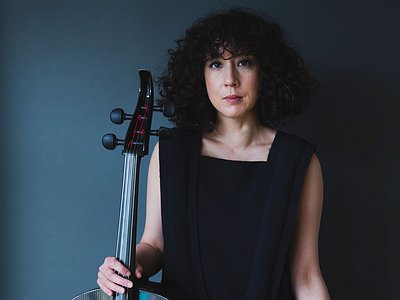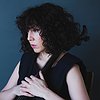Name: Clarice Jensen
Nationality: American
Occupation: Cellist, Composer
Current Release: For this from that will be filled on Miasmah
Recommendations: Seeing Is Forgetting the Name of the Thing One Sees, Lawrence Weschler’s book on Robert Irwin.
Website / Contact: If you enjoyed this interview with Clarice Jensen, visit her official website, which offers biographical information and a list of current events and projects.
When did you start composing - and what or who were your early passions and influences?
Composition began very recently for me, within the past few years, though it originated earlier, when having to improvise or contribute creatively to other artists' music. Compositionally, my early passions - which is probably to say my current passions - are repetition, duration and experience.
For most artists, originality is first preceded by a phase of learning and, often, emulating others. What was this like for you? How would you describe your own development as an artist and the transition towards your own voice? What is the the relationship between copying, learning and your own creativity?
I learned a lot touring with Stars of the Lid, A Winged Victory for the Sullen and Jóhann Jóhannsson. Performing their music taught me the value of taking one's time, of finding beautiful sonorities that last for long durations, of the powerful experience of repetition, especially slow repetition ... and repeatedly performing this music has indelibly influenced my composition, and probably my person too.
[Read our A Winged Victory for the Sullen interview]
As both a cellist and a composer, my constant search is for integrity, in performing the work of others and shining its true essence, or integrity in truthfully and sincerely writing music that is inside me. As a lone musician, career and relationships take you towards this integrity and away from it, but keeping sights set on integrity has always helped direct these meanderings.
Copying is copying. Sometimes as a performer you're expected to copy, and your work ends there. At Juilliard I felt I had to copy virtuosity and the work ended there, and that my failings could be quantified by how unsuccessful I was in my copy. That said, learning did exist there, particularly I was inspired by my teacher Joel Krosnick, from whom I learned first about contemporary music, atonal music, non-classical music. This was really the impetus for me to begin the path that has led me to where I am. My own creativity has at times been fed by both the instances of being required to copy out of necessity and by learning how to use effects pedals and other gear to supplement my sound and create new sonorities. Learning how to expand my sound palette as a solo performer has really fueled my creativity, although this knowledge also serves as a parameter too.
What were some of the most important creative challenges when starting out as a composer and how have they changed over time?
The biggest challenge has been having the courage to call myself a composer at all, as I've so long only identified as a cellist. I never trained traditionally as a composer, and I don't write music with that skill set and or craft. Since I don't, I guess it was a bit hard at first to take myself seriously, or to expect others to take me seriously. For so long in my mind, Beethoven and Brahms and Bach were composers, and then Schoenberg, and then eventually my friends Timo Andres or Caleb Burhans ... But owning a title like composer, while it doesn't change much, can do a bit for someone like me who greatly values integrity, and so, when I feel really like I am a real composer, I suppose it will do a something for my confidence.
Tell us about your studio/work space, please. What were criteria when setting it up and how does this environment influence the creative process? How important, relatively speaking, are factors like mood, ergonomics, haptics and technology for you?
I rent a loft in Bed Stuy and it has really fueled my creative workflow - I have a nice big space with tall ceilings which makes everything sound nice, the neighbors don't mind noise, I can have everything set up permanently. I'm ready to record and document all of the time, and this has been really great- listening back at any stage of composition, early or late, is really helpful to me.
My setup is quite simple when I perform - I don't use synths or laptop. I prefer to avoid playback. I want to be a soloist with a giant palette, and my instrument is my cello and effects pedals which I strive to use organically, as an extension of my cello. This is very important to me, and it is also important to me to employ pedals as proficiently as I play cello.
Could you take us through a day in your life, from a possible morning routine through to your work? Do you have a fixed schedule? How do music and other aspects of your life feed back into each other - do you separate them or instead try to make them blend seamlessly?
My days are quite varied - some days I am gigging as a NYC freelancer, some days I’m learning new music for an ACME concert, some days I don’t do any music at all. I wish I had a routine, but I don’t. When I feel like making music and trying to get down something new, then I’ll do that, or if I feel like practicing scales then I’ll do that. I think it’s important to try to blend your creative life as much as you can with your day to day. The music you create is really a declaration of who you are as a person, what’s on the inside, and so identifying that and aspiring to that true person all the time is important in all aspects, interactions, observations, movements, cadences etc.
There are many descriptions of the ideal state of mind for being creative. What is it like for you? What supports this ideal state of mind and what are distractions? Are there strategies to enter into this state more easily?
I’ve found that I will find myself doing nothing, and that those times are the times when I think of something real, which might be greatly vague and conceptual, or something hyper specific like a different way to order an effects loop. So, I’m trying to welcome the “doing nothing” times in my days too. These are generally not times where I am consciously trying to meditate or anything, I’ll just find myself doing literally nothing and then a thought or idea will come along. I’ve found this happening around naps too - I visited the Judd Foundation in Marfa a few years ago - it’s a huge compound where he lived and worked - and one things that struck me the most was that he had a bed in nearly every room, for naps.
Could you take me through the process of composing on the basis of one of your pieces that's particularly dear to you, please? Where did the ideas come from, how were they transformed in your mind, what did you start with and how do you refine these beginnings into the finished work of art?
"For this from that will be filled (b)" is the longest piece on my record. Originally when I first started performing it, it was very different, as it came out of an improvisation I did live for a small audience. I played it more and more and refined things, added the second section. At first it was only the sound of machinery and then of a very dark and murky place; eventually the music rose out of this and acoustic cello sound emerged, first close, and then bouncing around an enormous environment. I often make recordings of sounds I like or strange sonic phenomena - one time at Grand Central Terminal, the female announcement voice got stuck on a loop for a very long time attempting to say the word “ Attention” but only audible was what sounded like “Tension” and so I was transfixed by all of the bouncing around sounds of Grand Central combined with this machine woman saying “tension” over and over again so I captured it. I added this element to the piece at the end as it was I think what was needed to explain the use of repetition in the second half of the piece.
At a certain point I mapped all of the elements into a graphic score to help make some decisions about how long certain events should happen, etc. At this point it was a 12 minute piece. Then I recorded it with Francesco Donadello in Berlin and we dialed in and replaced sounds with better sounds (better reverbs, tape delay, record loops to tape etc). We had a rough edit and it was 18 minutes long and I realized it needed to be this long (most of the duration was added towards the end with two cellos repeating two different but similar loops and the “tension element”). So, it was a journey that started with improvising for people drinking wine and ended in the studio, and that studio version is what I perform live now.



